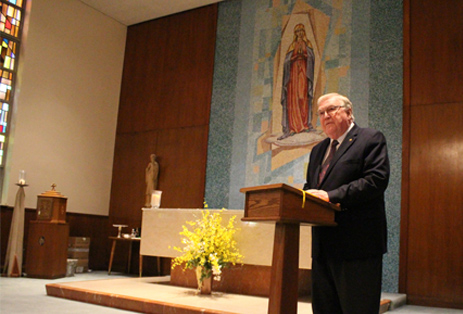
Congregational Letter Vol. 6, No. 6
The Easter Season is a time of joy and a time of hope. The signs of new life fill the senses. The post-resurrection stories of the disciples’ encounters with the Risen Lord intrigue me. They cause me to wonder, if I had been with the disciples, would I have recognized Jesus, the Risen Lord? The gospel story for Divine Mercy Sunday offers us a lot to ponder. We witness two apparitions of Jesus as Risen Lord.
On the evening of the resurrection, the disciples, seized by grief and fear, are huddled behind the locked doors of the upper room. Without warning they encounter Jesus. They don’t immediately recognize Him. So He gives them clues. His familiar voice uttering ‘Shalom,’ a common Jewish greeting that He often used. ‘Shalom’ conveys the deeply spiritual meaning of ‘peace‘, ‘May everything be right among you and between you and God’, ‘May you experience God’s steadfast mercy.’ The disciples would know that ‘Shalom’ was Jesus’ wish for them to have relationships grounded in the love of God.
In this encounter, the disciples are alert and present to their visitor. They still do not recognize, however, that it is Jesus. So He gives them another clue. He shows his hands and side. Immediately they recognize Jesus. And they rejoice.
This appearance of the Risen Lord had a clear purpose—to share the Resurrection. Again, Jesus says, ‘Shalom.’ ‘As the Father has sent me, so I send you.’ The disciples are sent on a mission of ‘Shalom’—to bring about God’s mercy and relationships grounded in the love of God. ‘Receive the Holy Spirit. Whose sins you forgive are forgiven them. Whose sins you retain are retained.’ The mission of ‘Shalom’ is one of compassion, mercy and forgiveness as we establish right relationships.
A week later the second apparition occurs. This time Thomas, who was not present the week before, encounters the Risen Lord. We know Thomas doubted what the others had told him. He would not believe that Jesus lives unless he could see and touch Jesus’ wounds. Again the familiar greeting directed to Thomas, ‘Shalom.’ Jesus did not chide Thomas for his lack of faith or for forgetting His promise ‘to be with them always even until the end of time.’ (Mt 28:20) Jesus is patient with Thomas and compassionately understands his unbelief. Jesus simply says to Thomas, ‘See my wounds. Put your finger here and see my hands and bring your hand and put it into my side and do not be unbelieving, but believe.’
The sight of Jesus’ wounds opens not only Thomas’ eyes, but also his heart. ‘My Lord and my God,’ is Thomas’ spontaneous and very emotional response to Jesus’ mercy.
I feel that today’s gospel story gives us a number of helpful points as we try to make God’s mercy present in our world.
First, we need frequent encounters with the Risen Lord–in our prayer, our contemplation, our solitude. We are to be ready for the unexpected encounter with the Risen Lord, as the disciples were in today’s story. We also need to be alert to the clues we receive. We may meet the unmerited mercy of the Risen Lord in someone’s kindness to us, in a family member’s patience with our failings, or in a friend’s silent support when we are lost or hurt and no words seem to help. We may meet the Risen Lord in the courage of those who stand up or speak on behalf of those who are being mistreated or in the face of injustice, in the forgiveness of a community member whom we have offended, or in our own need to ask for forgiveness.
Today’s gospel story reminds me of my personal need for God’s mercy even when I feel I do not deserve it. Like Thomas, I need to respond from the heart. ‘My Lord and My God.’ I am also more aware of my need to be truly present in my daily encounters with others. By being truly present to others, I open my eyes and heart to the Risen Lord.
Pope Francis in his homily for Divine Mercy Sunday gives us a wonderful framework for our lives as people seeking the Risen Lord.
Let us never forget that mercy is the keystone of the life of faith, and a concrete way with which we give visibility to the Resurrection of Jesus. Mercy allows us to open the door of our hearts and draw close to those who are ‘alone and marginalized’, recognizing those in need, and finding the right words to say to comfort them. Mercy warms the heart and makes it sensitive to the needs of our sisters and brothers. Mercy commits everyone to being instruments of justice, reconciliation, and peace.
I have included as a ‘review lesson’ the corporal and spiritual works of mercy. May you meet the Risen Lord often during these days. May others meet Him in you.
Corporal Works of Mercy
- Feed the hungry
- Give drink to the thirsty
- Welcome the stranger
- Clothe the naked
- Visit the sick
- Visit the prisoner
- Bury the dead
Spiritual Works of Mercy
- To instruct the ignorant
- To counsel the doubtful
- To admonish sinners
- To bear wrongs patiently
- To forgive offences willingly
- To comfort the afflicted
- To pray for the living and the dead
In Christ,

Brother Edward Driscoll, CFX | General Superior